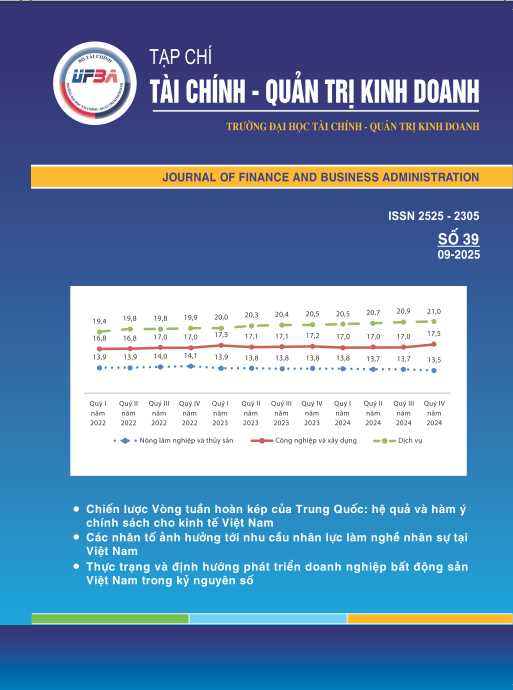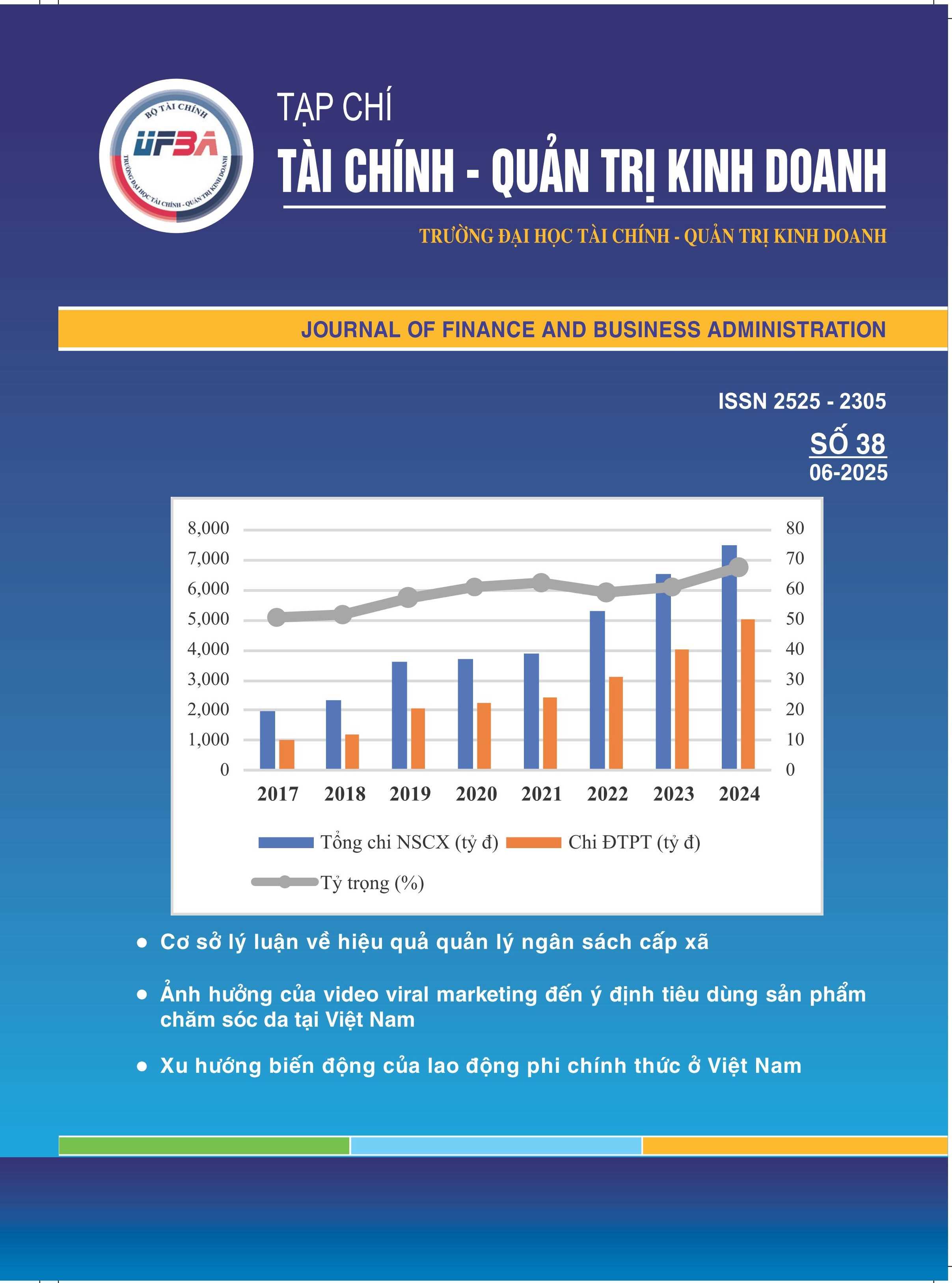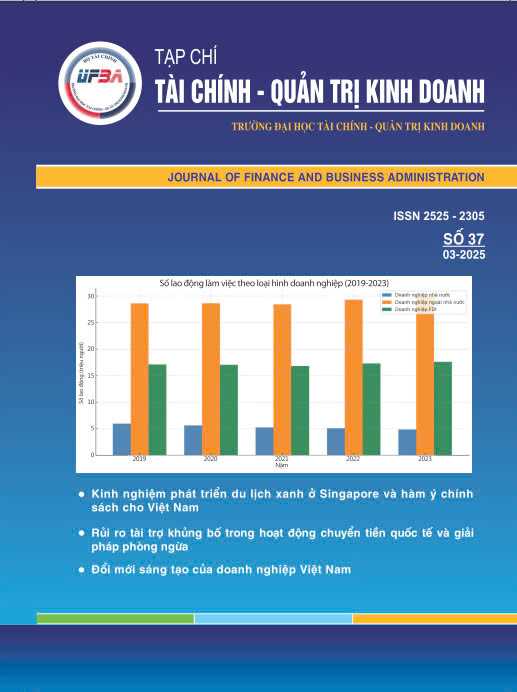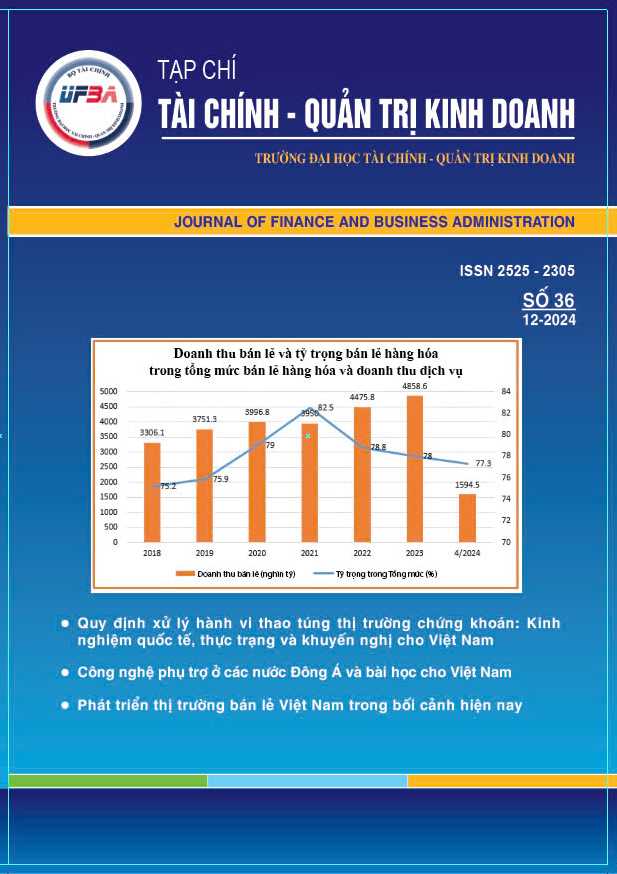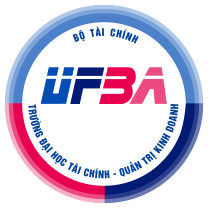JOURNAL OF FINANCE AND BUSINESS ADMINISTRATION, NUM 34.T06_2024
1. Impact of internal motives and external motives on the financial benefits and maket benefits of Vietnamese enterprices
Nguyen Thi Lien Huong, Ha Nguyen Ngoc Linh
This study focuses on evaluating the influence of two factors, internal motives and external motives, to bring financial benefits and market benefits when businesses apply the environmental management system ISO 14001. The authors surveyed the enterprise applying the environmental management system ISO 14001 after eliminating invalid votes to receive 258 valid votes. Research results show that internal and external motives both have a positive impact towards market benefits. While only internal motives impact financial gain, external motivation does not impact financial benefits. Based on the research results, the authors propose encouraging improvement and increasing benefits when applying environmental management systems.
2. Managing margin loan activities in Vietnam and some recommendations
Pham Tien Dat, Dang Dinh Son
Along with the development of the stock market, margin lending activities of securities companies have increased strongly in the market in recent times. This brings positive impacts by increasing tools for market transactions, creating more financial leverage for investors as well as profitability for securities companies. The management of securities companies' CVs also raises many issues that need to be focused on handling. The management still has some inadequacies related to the promulgation of legal documents, organization of supervision and handling activities. handling violations. Based on the identification of remaining problems in management, the article proposes some solutions to overcome the
above limitations.
3. Improving the quality of training logistics human resources at universities in Vietnam
Pham Quang Hai, Trinh Thi Hong Thai
Logistics human resources play a particularly important role, determining the development and competitiveness of the logistics industry in particular and the economy in general. In recent years, along with the strong development of the logistics industry, universities in Vietnam have also focused on improving the quality of training to better meet the increasing requirements of the industry. However, reality shows that there are still bottlenecks that need to be overcome. This article focuses on clarifying the situation of logistics human resource training in universities in Vietnam, thereby proposing solutions to improve the quality of logistics human resource training at universities.
4. Assessment of the satisfaction about the training quality students of the Faculty of Economics – Business management, An Giang University
Le Thi Thien Huong, Nguyen Hai Yen
The research was carried out with the aim to evaluate the satisfaction of the training quality of students of Faculty of Economics - Business Administration, An Giang University. The research is carried out through qualitative research conducted by group discussion of 05 students and quantitative study surveying 250 students from Faculty of Economics - Business Administration with 05 factors having the same impact and impact on customer satisfaction. Students' satisfaction about training quality is arranged in descending order of impact: Training program, Teaching staff, Service ability, Sympathy, Facilities.
5. The role of corporate financial risk management in the context of the 4.0 industrial revolution
Tran Thi Luong, Luyen Thuy Dung, Nguyen Quang Kha
The focus of business management is to bring the highest profit and profitability with the smallest possible risks. In the context that the economy in general and Vietnamese businesses in particular are having to gradually change to integrate into the global economy along with the development of the 4.0 industrial revolution, accurate identification and assessment is essential. The types of risks that affect businesses are necessary to establish the management of these types of risks in the most beneficial way for the business. This article collects and evaluates the impact of financial risks on businesses as well as analyzes the basic roles of financial risk management in businesses. From there, it helps investors, business owners and especially business administrators change their perception in corporate governance towards achieving the goal of maximizing corporate value.
6. Improve the quality of valuation services - Approach from the perspective of management subjects
Tran Dinh Thang, Nguyen Minh Nhat
In the valuation service market, the state participates both as a service user and at he same time as the subject managing organizations providing valuation services. Regardless of the role, the quality of valuation services is a concern of the State, but more attention will be placed on the role of the management subject. The article is based on reference to research projects with the same orientation to develop solutions to improve the quality of valuation services. By analyzing the current situation based on the study of the system of legal documents and secondary data of state management activities on valuation to point out a number of urgent issues for state management activities; and on that basis, to make a number of proposals and recommendations to the agency directly managing valuation activities in Vietnam - the Ministry of Finance - with the aim of improving the quality of valuation services.
7. Policies supporting tourism businesses in some Asian countries and lessons for Vietnam
Bui Thi Yen
This article focuses on evaluating the business support policies in the tourism industry of several Asian countries such as China, Thailand, South Korea, and Singapore in the effort to develop their national tourism. These countries have been successful in promoting tourism development, building infrastructure and technology to enhance the efficiency of business operations, growth, and overall development. From these results, Vietnam can draw valuable lessons and experiences in constructing supportive policies for the tourism industry, contributing to the nation's economic growth.
8. Improve the capacity of officers doing examination work and quality assurance at higher education institutions in Vietnam
Nguyen Thi Bich Huong, Nguyen Viet Hung
Quality assurance and inspection play a very important role in education and training in general and the teaching and learning process in particular. Reference work is always associated with quality assurance work in higher education institutions. The company ensures quality supervision of the entire educational system of state schools. To perform well the survey and quality assurance work, the capacity of management staff and functional members to perform testing and quality assurance work in higher education institutions plays a very important role part of innovating and improving the quality of education and training. Therefore, to improve the capacity of officials in research, testing and quality assurance functions, it is necessary to find solutions to improve knowledge, skills, quality products... thereby further promoting the game. of Vuong Ngu officials working on experiments and quality assurance in carrying out educational and training tasks at higher education institutions. This article clarifies the content of the above article.
9. Financial policy for marine economic development in some countries and lessons learned for Vietnam
Vu Ngoc Loan, Nguyen Thi Ngoc Ha
To develop the marine economy, mobilizing resources, including financial resources, is absolutely important. In this study, the author has systematized the current situation of financial policies to develop the marine economy of several countries around the world through groups of issues such as: (1) prioritizing the allocation of resources to increase State budget spending to promote marine economic development; (2) promulgate preferential policies on taxes and fees for development of prioritized industries and fields; (3) apply preferential policies related to land finance; (4) deploy preferential credit policies for marine economic development; (5) implement programs to support people and businesses in purchasing insurance for a number of activities related to marine economic development and (6) other policies to promote marine economic development. Simultaneously, through assessing the current status of policies to develop Vietnam's marine economy recently, the author has pointed out limitations and drawn lessons for Vietnam.
10. Training green human resources in Vietnam logistics industry
Nguyen Thi Phuong Thuy, Nguyen Manh Hung,Tran Thi Thu Trang
In the context of industry achieve this green goal is human resources trained in a "green" direction. Training green human resources in the logistics industry is a new field of human resource training, human resources trained with professional knowledge, environmental awareness, capacity, increasingly deep international economic integration, Vietnam's logistics industry plays an important role in maintaining the flow of goods and services around the world and contributes greatly to Vietnam's GDP. However, the strong growth of the industry has led to onsequences that affect the environment. Therefore, reducing emissions, environmental pollution, saving resources, energy, using environmentally friendly packaging, etc. are inevitable trends of the logistics industry today. One of the factors that helps the logistics awareness of environmental protection, green skills and professional qualities. The article has systematized the theoretical basis of green human resource training, clearly stated the current status of human resources in the logistics industry as well as the results achieved in training green human resources in the logistics industry. In addition, the article also pointed out some limitations, pointed out the causes and proposed some solutions to improve the training of green human resources in the logistics industry in Vietnam today

